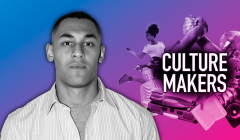
‘Subculture is the most powerful tool we have’
Louis Persent, Co-Founder and Creative Director at Weirdo on the power of embracing the niche

This National Inclusion Week, Ali Hanan, CEO of inclusion, equity and diversity organisation Creative Equals, explores why DEI is smashing it at Cannes across so many categories.
Cast your eyes over this year’s Cannes Lions Grand Prix winners through the lens of diversity and inclusion and you’ll see how diversity, equity and inclusion is underpinning many of this year’s major winners. Inclusivity is a competitive advantage.
More importantly, this game-changing creativity is going beyond ‘representation’ - where brands simply have diverse casting - into business strategy. To bring this to life let's dig into two Cannes Lion winners relevant right now, explore why they won and ask if the work had impact beyond the award show and ask how to raise the bar moving forward.
Unilever won the Grand Prix with a deodorant prototype, billed as the world’s 'first adaptive deodorant built with a diverse disability community'. Right from the start of the product co-creation process, Unilever partnered with three non-profit organisations, the Muscular Dystrophy Association, Open Style Lab, and The Lighthouse Chicago, to test the prototype with 200 consumers with a range of physical disabilities. An approach which brings to life the brands’ ‘nothing about us without us’ approach.
While this landed a Cannes Lion for Innovation, for CriticalAxis.org, a disability community, this work didn’t resonate. One of the tropes in this space are ‘narratives that glorify the overcoming of pain and body fallibility’. As site CriticalAxis.org points out, Maria, a blind skater, has ‘her fall in the rink positioned differently to the implied risk of her falling with her cane’, reiterating ‘ablenormatives modes of movement consistitue freedom. This reflects the social model of disability, where disabled modes of movement are constrained by society. For the disabled community, this becomes ‘inspiration exploitation’, where disabled people have to be seen to be superhuman, just to be accepted.
Inclusion has always been a key part of the Unilever business, however this product is a prototype. If Unilever embraced the concept of ‘total universalism’ - a concept that a piece of design is for everyone - then this would be the only product for retail. The reality is commercially driven: on a retail shelf, this larger size deodorant would take up less units per shelf space. The real question is: who would foot the profit shortfall?
It won a Cannes Lion Grand Prix in the Brand Experience and Activation category, but could Mastercard do more to support the trans community?
Labour and the Conservative party have clashed this week on the issue of trans rights, as Sir Keir Starmer said it was wrong to say “only women have a cervix” and the health secretary, Sajid Javid, said this was a “total denial of scientific fact”.
A clash which comes at a time when the UK is sitting alongside Hungary, Poland and Turkey as a country with a marked increase in anti-trans hate. The fact is trans people the world over are the most marginalised, stigmatised and likely to be abused.
The insight that underpins Mastercard’s award-winning campaign highlights the fact 68% of transgender people say not one of their IDs has the name and gender they prefer. What’s worse, 32% who do not ‘present’ as their gender are assaulted, harassed or abused.
To facilitate change and promote acceptance, Mastercard created ‘True Name’, a product feature that allows trans people to put their preferred name on the front of their card, without the need for a legal name change. They urged other companies to adopt True Name or change their own policies on card name changes, now adopted by two US banks.
There is no doubt DEI needs to be at the heart of the customer experience. The power in this campaign is the way it was shared with the category, challenging the whole sector to do better. Yet going further was the Starbucks Brazil campaign ‘I am’, which won the Cannes Lion for Change. To enable trans people to change their legal names on the Day of Trans Visibility Starbucks turned their stories into registry offices - and the result was a 7-times increase in name changes in São Paulo. A campaign with the trans community truly at its heart.
To hear more about how inclusivity is raising the bar for National Inclusion Week, discover how DEI has become the Cannes Lion award X-factor, join Ali Hanan, founder/CEO, Creative Equals, Steph Matthews, Senior Business Director at Creative Equals and Efrain Ayala, Global Diversity & Inclusion Director, Marketing at Reckitt, September 30, 4-5pm here.
Looks like you need to create a Creativebrief account to perform this action.
Create account Sign inLooks like you need to create a Creativebrief account to perform this action.
Create account Sign in